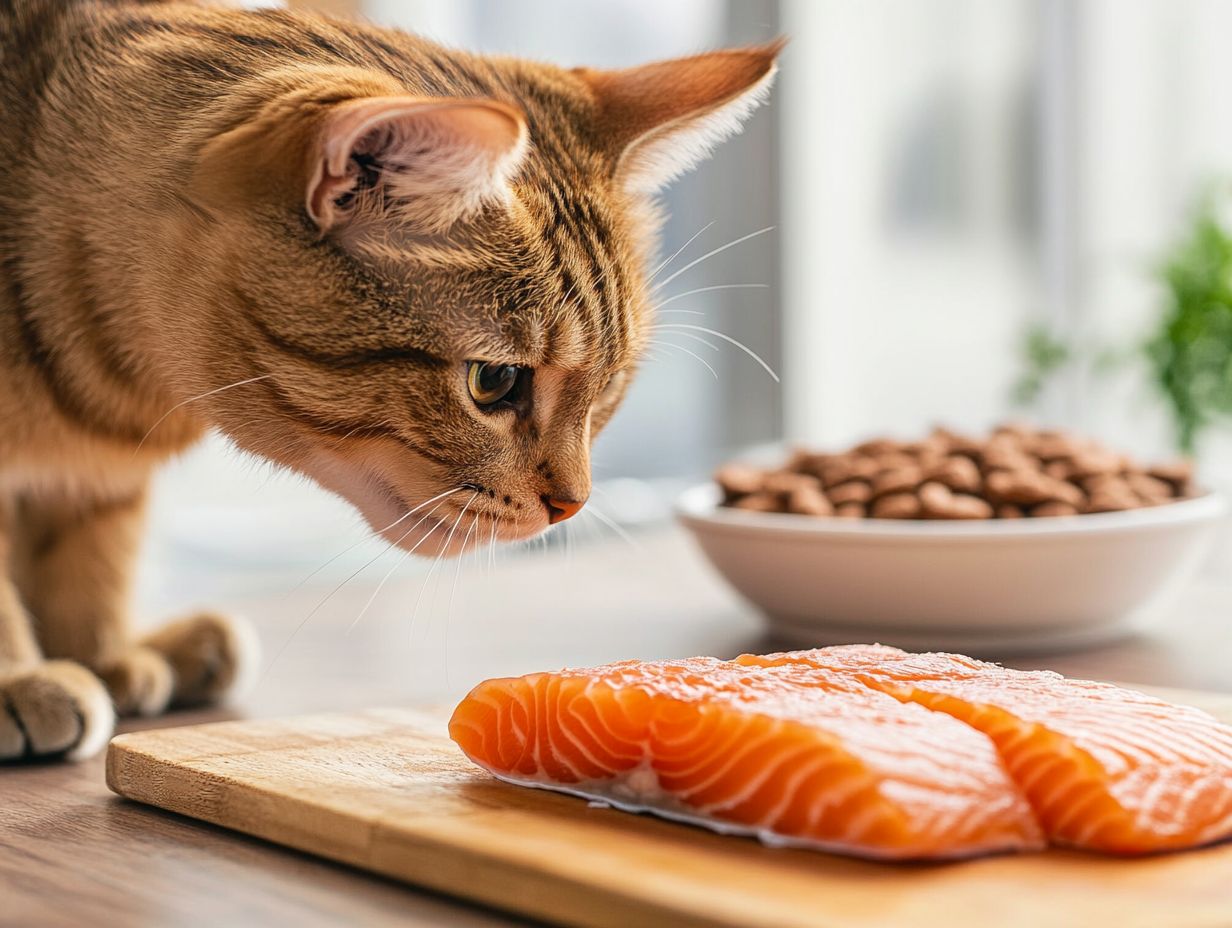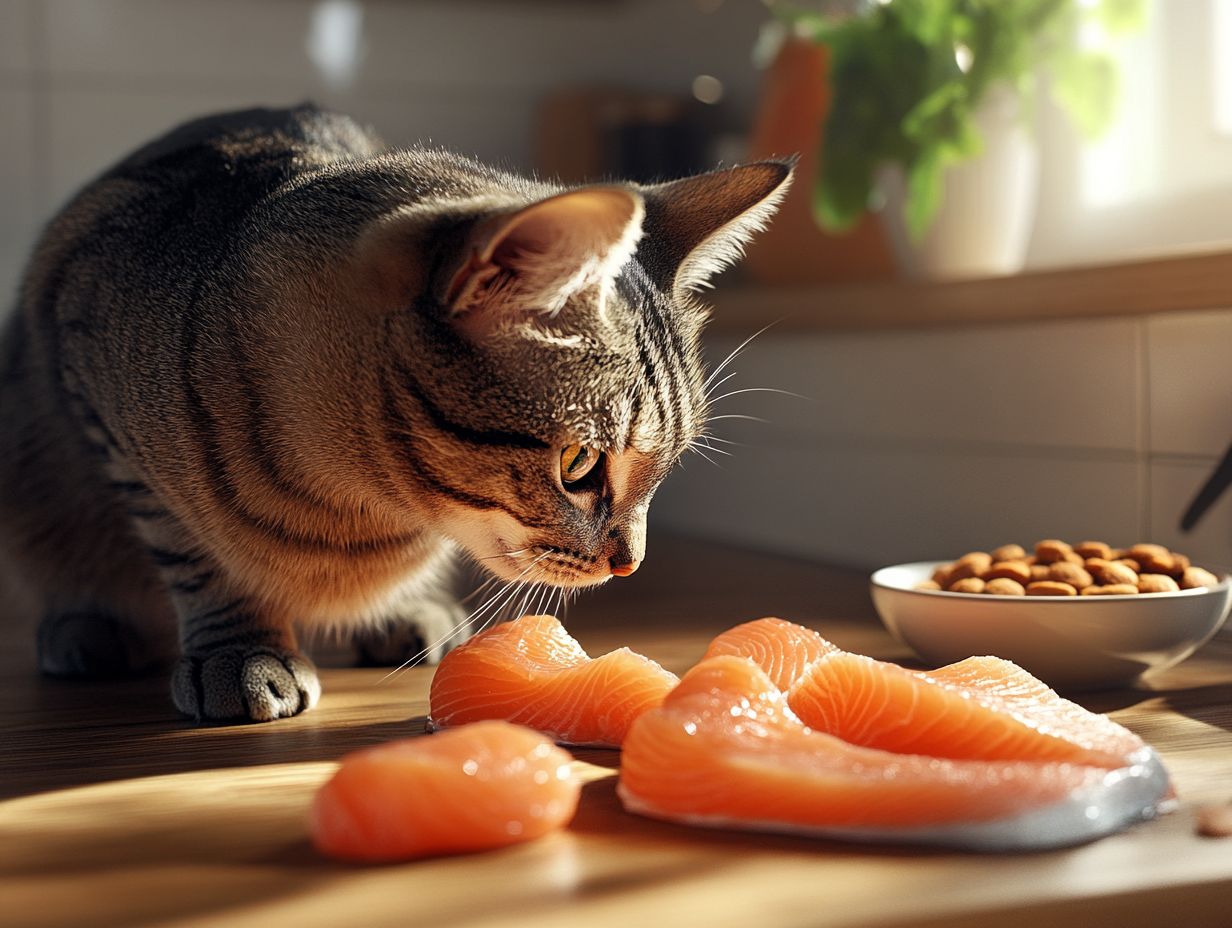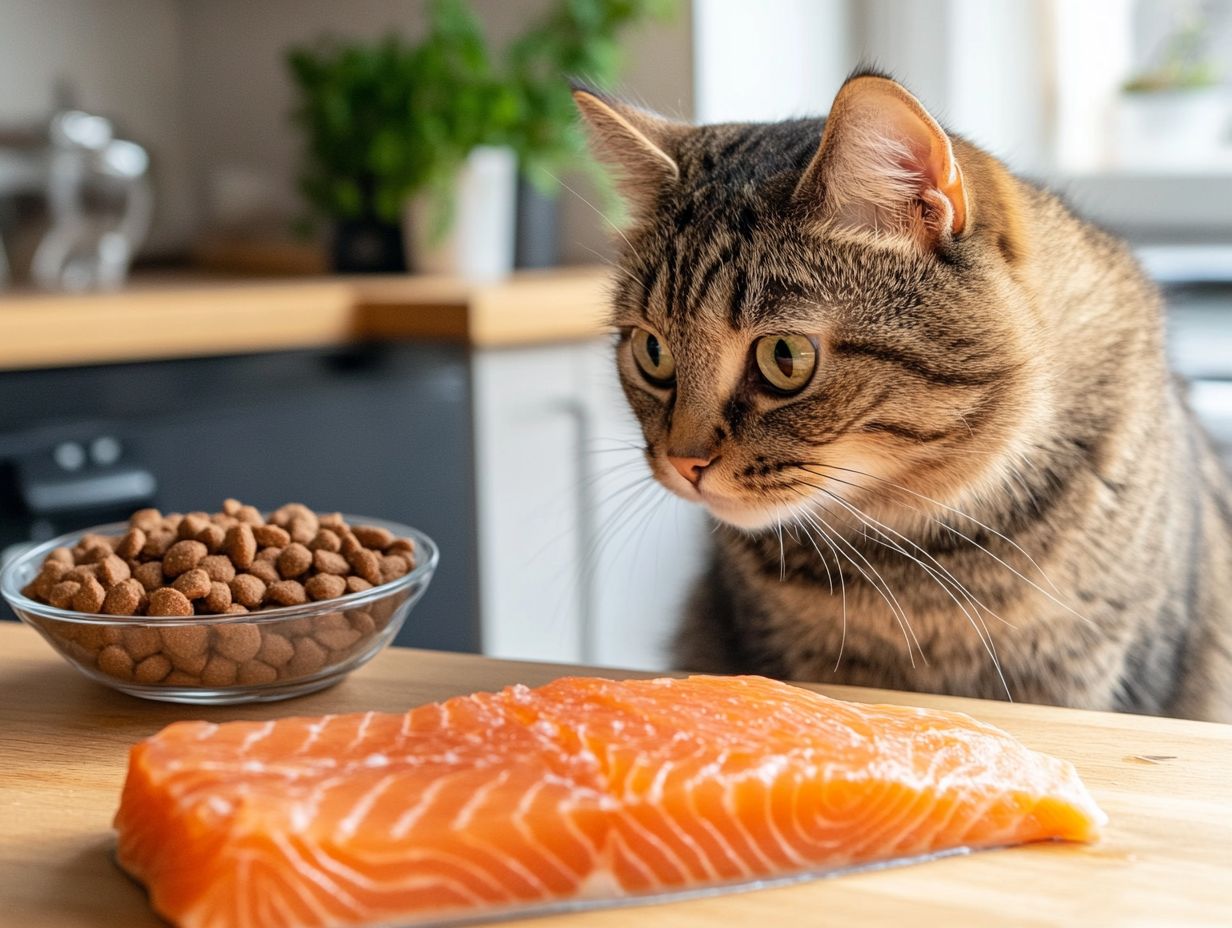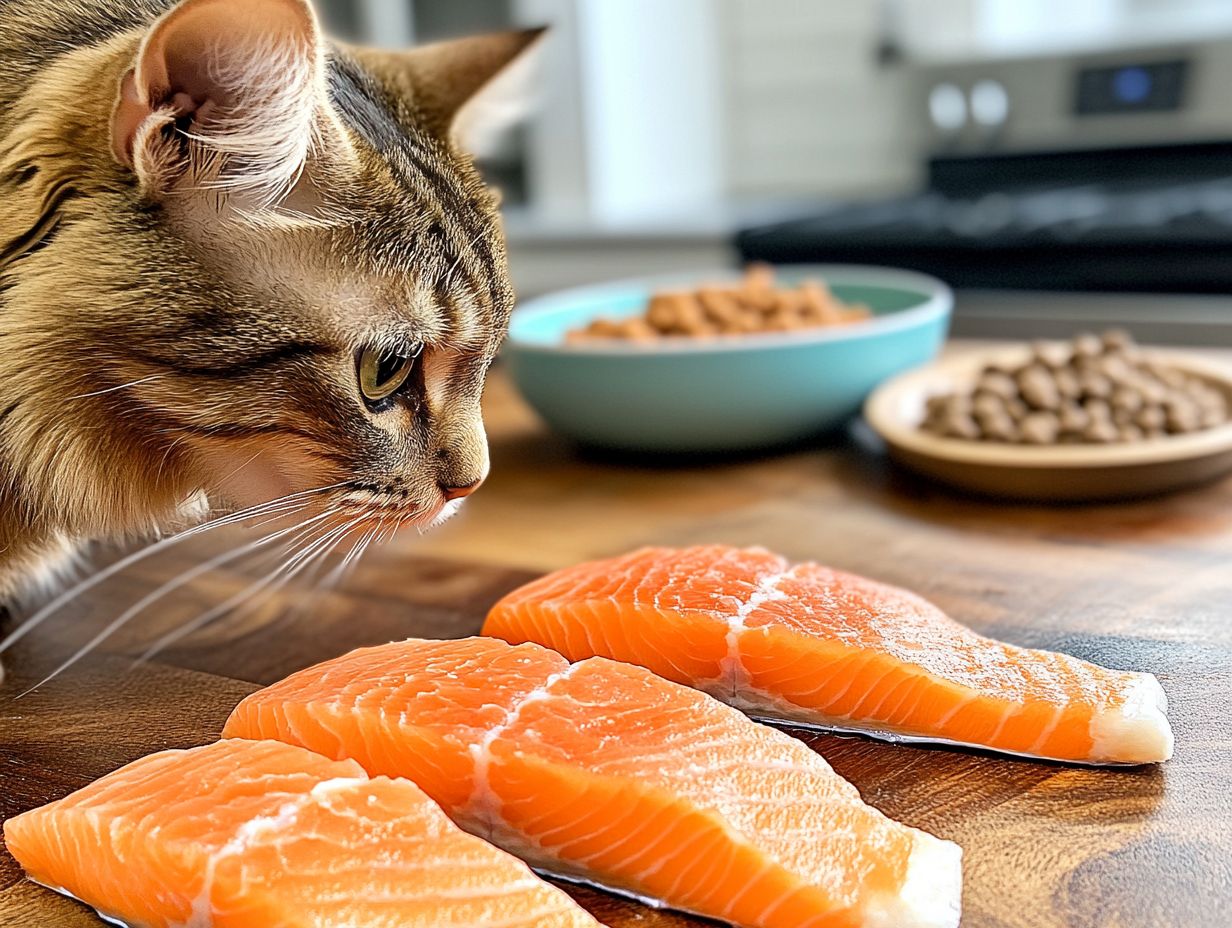Cats and their diets often spark lively debates among pet owners, especially regarding feeding them salmon. Have you ever wondered if your feline friend can enjoy this tasty fish? This article will provide clear guidelines on safe feeding practices for cats concerning both raw and cooked salmon, weighing the pros and cons.
While many cat enthusiasts advocate for the nutritional benefits of salmon, experts warn that raw salmon can pose risks, such as foodborne illnesses and nutritional imbalances. This article explores various perspectives on the subject, providing actionable tips and safe alternatives to ensure your cat stays healthy and happy.
Key Takeaways:

- Feeding cats raw salmon can pose potential risks, including foodborne illnesses like Salmonella and nutritional imbalances.
- However, raw salmon also has benefits, such as high nutrient content and omega-3 fatty acids that can improve skin and coat health.
- If you are hesitant about giving your cat raw salmon, cooked salmon is a safer alternative.
- Limit salmon to no more than 10% of your cat’s daily diet.
The Debate on Cats Eating Salmon
The question of whether cats should eat raw salmon is widely debated, with differing opinions among cat owners and veterinarians alike, including Dr. Renee Schmid, DVM. Supporters argue that many pet owners have observed their cats enjoying fish. Salmon is rich in protein, omega-3 fatty acids, and essential nutrients that contribute to a cat’s overall health, helping to maintain healthy skin and a shiny coat. However, smoked salmon should be given in moderation.
Experts like Dr. Renee Schmid, DVM caution that raw salmon may harbor pathogens harmful to feline health, including parasites that can lead to serious illness. It is crucial to consider both sides of this nutritional debate, taking into account the recommendations from the American Veterinary Medical Association and the World Small Animal Veterinary Association.
Pros of Feeding Cats Salmon
Many cat owners believe that incorporating fish into their cats’ diets provides a flavorful treat packed with essential nutrients. This appeal stems from fish’s enticing smell and texture, which naturally attract felines. Cats enjoy fish because it stimulates their sense of smell and taste.
Raw salmon is rich in omega-3 fatty acids, contributing to healthy skin and a shiny coat. Many owners justify adding fish to their pets’ diets as it offers a unique source of protein along with vital vitamins such as B6 and B12, and minerals.
Cons of Feeding Cats Raw Salmon
Despite the benefits, pet owners must consider the dangers associated with raw salmon. According to guidelines from the American Veterinary Medical Association, raw salmon can contain harmful pathogens such as Salmonella and Listeria. It is recommended to offer cooked salmon as a safer option or consult with a veterinarian to ensure the meal is balanced and safe. A well-rounded diet should include a variety of protein sources.
Potential Risks of Feeding Cats Raw Salmon
Feeding raw salmon to cats poses several risks, including foodborne illnesses, parasites, and allergic reactions, which can negatively impact their overall health and well-being. Moderation and consideration of all health risks are crucial for maintaining good cat health.
Foodborne Illnesses and Parasites

Conclusion
By weighing the benefits of salmon against the potential dangers, responsible cat owners can make informed dietary choices for their pets. Always consult your veterinarian before introducing new foods into your cat’s diet to ensure they remain healthy and safe.
Understanding the Risks and Benefits of Feeding Raw Salmon to Cats
Feeding raw salmon to cats presents both risks and benefits. While it offers high nutrient content, particularly omega-3 fatty acids, it can also transmit harmful parasites and cause nutritional imbalances. Understanding these factors can help pet owners make informed dietary choices for their feline companions.
Important Warnings About Raw Salmon
Raw salmon can transmit harmful parasites, specifically Neorickettsia helminthoeca and Nanophyetus salmincola, which can lead to severe foodborne illnesses in cats. These dangerous parasites are responsible for salmon poisoning disease, characterized by symptoms such as vomiting, diarrhea, and fever. According to experts like Brendan Howard, understanding these risks can help pet owners make better dietary choices.
The risk of transmission is particularly high when cats consume undercooked or contaminated fish. Therefore, cat owners must ensure they purchase high-quality fish and be aware of the risks associated with feeding raw salmon to their pets.
The Pet Poison Helpline is a valuable resource that can help pet owners understand the symptoms and preventive measures necessary for their cats’ health. Furthermore, guidelines from organizations like the American Veterinary Medical Association can provide additional insights into safe feeding practices.
Nutritional Imbalance
A diet excessively high in raw salmon can lead to a deficiency of essential vitamins and omega-6 fatty acids in cats, resulting in nutritional problems. This imbalance can further exacerbate issues like steatitis, making it vital to consult with a veterinarian before making any changes to your cat’s diet.
As obligate carnivores, cats require a balanced diet consisting of a variety of proteins, carbohydrates, and fats to provide energy and support normal bodily functions. When cats consume too much raw salmon, they may not receive adequate amounts of certain nutrients, such as taurine, which is crucial for heart and eye health.
Additionally, an imbalance in fatty acids may occur, potentially impairing the immune system. To ensure their pets’ optimal health, cat owners should prioritize providing a complete and balanced diet. This diet should include commercially prepared cat food formulated to meet their specific nutritional needs.
Potential Benefits and Risks of Raw Salmon
Despite the associated risks, feeding cats raw salmon offers benefits such as its high nutrient content, particularly omega-3 fatty acids, which contribute to maintaining healthy skin and a shiny coat. For more information, check out this article on Can Cats Eat Raw Salmon? Safe or Dangerous?. Always consult with your veterinarian and consider the guidelines from the American Animal Hospital Association and the World Small Animal Veterinary Association.
High Nutrient Content
Raw salmon is a high-protein food source rich in omega-3 fatty acids, making it an ideal option for feline diets that emphasize raw, nutrient-dense foods. It supplies cats with essential building blocks for muscle growth and repair.
Additionally, raw salmon is a good source of vital vitamins such as B12 and D, both of which are important for the overall health of cats. Omega-3 fatty acids, including EPA and DHA, play a crucial role in promoting cardiovascular health and reducing inflammation, which is particularly beneficial for cats with chronic conditions.
Studies have demonstrated that diets high in omega-3 fatty acids can enhance the skin and coat condition of cats, while protein contributes to energy levels and overall vitality. Therefore, incorporating raw salmon into a cat’s diet can significantly improve their overall health and potentially extend their lifespan.
Improving Skin and Coat Health
The omega-3 fatty acids found in raw salmon can greatly enhance a cat’s skin and coat health, improving both shine and overall condition. These fatty acids play a crucial role in reducing inflammation and alleviating various skin issues, such as dryness and irritation. Additionally, omega-3s can help prevent steatitis, a condition characterized by inflammation of the fatty tissue.
Research indicates that omega-3s help regulate the production of sebum, which is essential for maintaining adequate moisture levels in the skin. Studies have shown that an increased intake of dietary omega-3s significantly reduces shedding and overall itchiness, promoting a resilient and shiny fur coat that further enhances a cat’s natural beauty.
Alternatives to Raw Salmon for Cats

Raw salmon can pose risks to cats; however, safe and nutritious alternatives, such as cooked salmon and other protein sources, help owners provide a balanced diet for their pets.
Cooked Salmon
- Ensure cooked salmon is free of bones.
- Feed in moderation, around 1-2 ounces for average-sized cats, and adjust based on your cat’s size.
- Consider alternating with other protein sources like chicken or turkey for a balanced diet.
In conclusion, while raw salmon has its benefits, it also carries significant risks. Pet owners should consult with a veterinarian before making dietary changes to ensure their cats’ health is prioritized.
Feeding cooked salmon to cats can be a nutritious and safe option. It offers essential protein and omega-3 fatty acids, with fewer risks than raw fish. Cooked salmon is high in protein, providing vitamin D and B vitamins, which are vital for a healthy and active life for felines. Cooked salmon from reputable sources, such as the Alaskan Salmon Company, provides high-quality nutrients and minimizes health risks.
Additionally, cooked salmon is less likely to harbor harmful bacteria and parasites that are more common in raw salmon. When properly prepared and cooked, salmon becomes an enjoyable treat for cats, significantly reducing the risks associated with feeding them raw fish.
To safely provide cats with the nutritional benefits of salmon, it should be fully cooked—preferably steamed or baked—and free of any added flavorings or oils. A serving of cooked salmon should not exceed 1-2 ounces for an average-sized cat.
In this form, salmon can be a healthy addition to a cat’s diet, offering easily digestible nutrients that promote healthy skin and fur and support heart health through its omega-3 content.
Other Protein Sources for Cats
As an additional note, the Alaskan Salmon Company provides high-quality fish products that could be considered for your pet’s diet.
Along with salmon, other protein sources for cats include chicken, turkey, and tuna. These options provide essential nutrients and can be incorporated into a balanced diet that meets all of a cat’s dietary needs. Cook chicken and turkey thoroughly to avoid bacterial contamination.
Chicken and turkey are popular protein choices for pets, as both are lean meats that deliver high-quality protein and essential amino acids crucial for muscle development. Tuna is also a common treat for many cats, offering essential protein and omega-3 fatty acids that promote a healthy coat and skin.
A varied diet is beneficial for a cat’s health. It aligns with their carnivorous instincts and prevents dietary monotony, which is vital for maintaining their appetite. Diverse sources of nutrition can enhance overall well-being, helping to prevent nutritional deficiencies and promoting longevity.
Frequently Asked Questions
Can cats eat raw salmon?
Yes, cats can eat raw salmon, but it is not recommended as a regular part of their diet due to potential health risks. Raw salmon does not provide a balanced diet.
Is raw salmon safe for cats to eat?

Raw salmon can contain harmful bacteria and parasites, such as Neorickettsia helminthoeca and Nanophyetus salmincola, which can make your cat sick. Therefore, it is not considered safe for them to eat.
What are the dangers of feeding raw salmon to cats?
The biggest danger of feeding raw salmon to cats is the potential for bacterial and parasitic infections, such as salmonella or toxoplasmosis. Experts like Renee Schmid, DVM, from the Pet Poison Helpline, advise caution.
Can cats get sick from eating raw salmon?
Yes, cats can get sick from eating raw salmon due to the potential for harmful bacteria and parasites. It’s important to consider guidelines from veterinary sources for safe feeding practices.
Do cats need to eat raw salmon for a balanced diet?
No, cats do not need to eat raw salmon for a balanced diet. They can obtain all the necessary nutrients, including vitamins B6 and B12, from high-quality, commercially-prepared cat food.
What should I do if my cat accidentally eats raw salmon?
If your cat has consumed raw salmon, monitor them for any signs of illness and contact your veterinarian for advice. Depending on the amount and type of salmon consumed, such as Alaskan Salmon Company’s products, they may need to be treated for potential infections.
In summary, cooked salmon can be a beneficial addition to your cat’s diet when prepared safely. Always consult your veterinarian for personalized dietary recommendations that ensure your pet’s health and well-being.